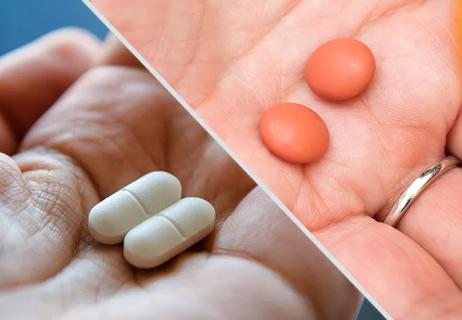Advertisement
Find out how they’re making life a little easier for gender-diverse kids

Imagine being trapped in a very uncomfortable space.
Advertisement
Cleveland Clinic is a non-profit academic medical center. Advertising on our site helps support our mission. We do not endorse non-Cleveland Clinic products or services. Policy
You don’t feel right being there, you can’t relate to anything that’s going on and nothing reflects who you truly are.
What if that space was your own body? What would you do and how would you cope?
Some transgender and nonbinary youth live with these feelings every day. Puberty can make these feelings far worse. These kids might feel like their bodies are betraying them because the developmental changes they’re experiencing don’t line up with how they identify. It’s frustrating and can be quite overwhelming.
Fortunately, there are medical interventions that can help eliminate those feelings of frustration and betrayal. One of those interventions comes in the form of prescription medications that are known as “puberty blockers.”
“Puberty blockers are medications that we give to kids to pause puberty,” says pediatric endocrinologist Julia Cartaya, MD. “The medicine usually contains gonadotropin-releasing hormone (GnRH) analogs, which is a hormone your body makes naturally. It’s considered the master puberty hormone and the body produces it in cycles.”
Dr. Cartaya says puberty blockers have been given to children who experience precocious puberty (puberty that starts much earlier than usual) for about 40 years.
Advertisement
During puberty, some hormone levels tend to go up and down throughout the day. Those highs and lows produce changes in the body like facial hair growth, voice deepening, height changes, breast development and menstruation.
Puberty blocker medications contain stable amounts of gonadotropin-releasing hormone (GnRH) analogs, which help suppress sex hormones like testosterone and estrogen. Once these hormones are “blocked,” the physical changes that would occur during puberty are paused.
Common puberty blockers include:
Puberty blockers are only given to children who have started puberty. For a child who is assigned female at birth, Dr. Cartaya says puberty typically starts between the ages of 8 and 13. For a child who was assigned male at birth, the range is between 9 and 14.
“This threshold exists because there is some evidence that kids who are gender-questioning before puberty starts often decide that they are OK with the gender that they were assigned at birth after they start puberty. The most recent data shows that about two-thirds of kids will.”
But if a child has started puberty and is experiencing gender dysphoria, puberty blockers might help them adjust.
Gender dysphoria is when a person experiences psychological distress because the sex that they were assigned at birth doesn’t line up with how they feel inside. A kid who is experiencing gender dysphoria might say that they feel like they were born in the wrong body or ask to be treated as the gender with which they identify.
“A third of kids will have an exacerbation of their gender dysphoria during puberty. These kids often feel like their bodies are betraying them in many ways,” explains Dr. Cartaya. “That can also be an indication that gender dysphoria is going to last throughout their lifetime. This is the reason why we wait until puberty to start children with gender dysphoria on puberty blockers.”
However, gender dysphoria is not always the result of one’s gender identity not lining up with how their body is changing. It can also stem from the stress of dealing with societal norms, as well as the possibility of being rejected or bullied. It’s also important to note that not every transgender or nonbinary person experiences gender dysphoria.
Puberty blockers are administered by a healthcare provider through injections or an implant that goes under the skin. In order for puberty blockers to keep working, injections must be received monthly or every few months, and implants have to be replaced yearly.
Advertisement
When a child starts a puberty blocker, it doesn’t mean their body’s puberty changes are permanently suspended. A puberty blocker is more like a short-term solution. It stops the process for as long as a child is using the medication. Once usage stops, puberty will resume.
“It’s more like a pause. If we stop the medicine, puberty can restart,” says Dr. Cartaya. She adds that once it begins again, the body will go through puberty that’s associated with the sex assigned at birth.
Puberty blockers are generally safe when used on a short-term basis. They’ve even been used to treat conditions like prostate cancer, breast cancer and endometriosis.
Puberty blockers can be instrumental in preserving the mental health of young people who are establishing their gender identity. One study showed that transgender teens who were able to receive puberty blockers experienced “superior mental health outcomes” when compared with those who wanted the medication but did not receive it. This goes to show that puberty blockers play a significant role in gender-affirming care.
As for the drawbacks, bone mineral density is one thing that has to be monitored while a puberty blocker is being used.
“Puberty is an important time for bone strength development,” cautions Dr. Cartaya. “Because we’re pausing it, the decrease in bone mineral density that we see is likely due to the lack of the pubertal encouragement of bone growth. Once a child goes off of a puberty blocker, the bone mineral density increases, but it does not get back to where it was before. To help maintain healthy bones, we keep a close eye on vitamin D levels and make sure that kids are getting enough calcium.”
Advertisement
Another watch-out — if a child with male genitalia starts puberty blockers early in puberty and later wants to have gender-affirming surgery, they may not develop enough skin on their penis and scrotum for the most common genital surgical procedures. However, if this occurs, Dr. Cartaya says other options are available and they should be discussed with a surgeon after the age of 18.
Puberty blockers aren’t for kids who are OK with their body changing or kids who have finished puberty. They’re also not for kids who aren’t showing any signs of puberty.
Lastly, the side effects. Depending on the type of puberty blocker, they could include:
While we’ve heard numerous stories about transgender or gender-diverse kids being rejected by loved ones, friends or people in their communities, Dr. Cartaya says most of the interactions that she has seen have been quite positive.
“There is evidence to show that when families support gender identity, their children have developmentally standard levels of mental health concerns like depression and anxiety,” Dr. Cartaya says. “When transgender or nonbinary kids are truly seen and respected, they can thrive.”
Advertisement
Learn more about our editorial process.
Advertisement

Regurgitation of breastmilk or formula is common, but it could be a sign of GERD in some cases

Pressing a glass on a rash provides some clues, but it’s not foolproof

The flu can make kids seriously sick, so watch for signs of dehydration and breathing problems

It’s important to share the news in an honest and age-appropriate way and to open the lines of communication going forward

Tamiflu can shorten your child’s illness and even help prevent the flu

Children as young as 6 months should get vaccinated, but dosage guidelines depend on kids’ ages and past vaccines

Imagination, completing tasks and social interactions are all key benefits for your brain

First things first: It doesn’t mean anybody did anything wrong

When you get bogged down with mental tasks, you can experience mood changes, sleeplessness and more

You can alternate these OTCs to help with pain management and fever reduction

Non-exercise activity thermogenesis is all the activity we do that’s not technically exercise but is still important to your health and well-being